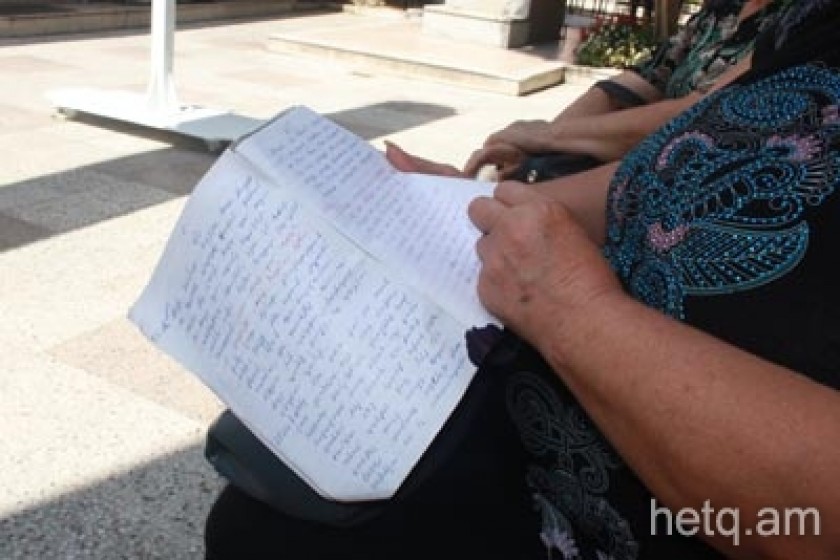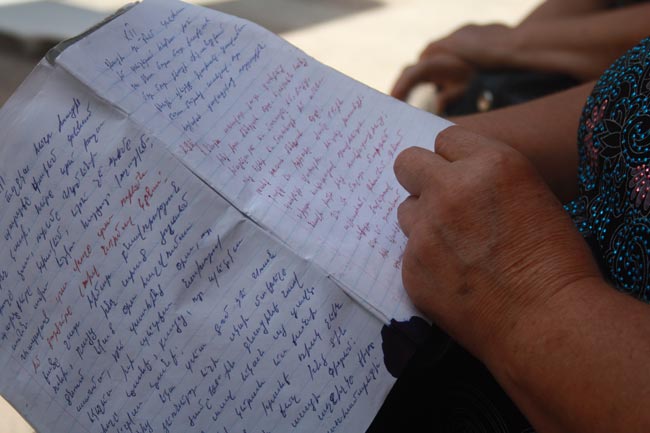
Women from Armenia Working in Turkey: “Where are the eyes of my government?”
Ani Hovhannisyan
Edik Baghdasaryan
During our recent trip to Istanbul, we would spend our afternoons in the courtyard of the Sourp Prgitch (Holy Redeemer) Armenian Chapel in Yedikule.
Women from Armenia who had come to Istanbul to work would come to the church to pray and light candles.
We would sit on a courtyard bench and listen to their conversations as they made their way back outside. From their accents, we could tell where in Armenia they had come from – mostly Gyumri, Vanadzor and Yerevan.
One woman who had come to the church couldn’t control her tears. Let’s call her Silva.
She sat down besides us and began to tell her tale.
“My son is 24 and unmarried. He’s fallen sick in another country and I can’t go to him. I have come to the house of God to request...Where are the eyes of my government? Why do they torture us so?” says a trembling Silva.
Her son was sent to Armenia for treatment but Silva hasn’t been able to return. She can’t get a visa because she’s in Turkey illegally.
Five years ago, when Silva decided to travel to Turkey, she used to farm land in Armenia. Taxes and irrigation problems forced her to stop and seek greener pastures elsewhere.
“They say, good heavens, they went to Turkey. Just look at what we are doing in Turkey. Our government in Armenia kicks us out or makes us stand at the precipice. They tell us to either jump off or die from starvation. That’s why today we are taking care of other people’s sick and elderly. So that we can make enough money to live on,” Silva says.
Silva works for a Turkish family – cooking, cleaning and tending the elderly. When the day’s work is done, Silva jots down her thoughts and emotions in a well-worn diary. She took it out and started to read some entries to us.
|
“Two and a half months are left for my trip to Armenia. Hopefully, I’ll go with some money in my pocket to pay off my debts and to see my Armen. I want to see where he is serving in the army. It’s on the border and I am afraid for my dear Armen.” “I told them that I didn’t like Turks. After that we had a falling out, but I don’t care. I love my people, the land and water of Armenia. I miss my children. But I had no other recourse; I left my country on a temporary basis. I will return to my beloved Armenia; my small but proud Armenia.” “I am getting irritated but I have to be patient. There are two months left to go. God, please give me the patience I need. You are my only hope.” |
These women from Armenia, who now work in the households of Turks and for well-to-do Istanbul Armenian families, don’t have an easy time of it. They feel used, abused and overworked.
One Armenian woman, Karineh, has changed jobs several times. She says it’s impossible to work for people who insult your dignity.
“We basically do household chores and then tend to the sick and elderly. We work for both Istanbul-Armenians and Turks. To be honest, the local Armenians are rougher on us than the Turks. You cook the meals, wash the dishes, and clean the house. And when you sit down for two minutes of rest they immediately ask, ‘and what about the windows?’ Yes, it’s tough and you can’t get along with everybody.”

Most of the women we talked to in Istanbul feel insulted by the intolerance of local Armenians that lurks just under the surface. On the other hand, Istanbul-Armenians believe that the main difference between them and those from Armenia is only on a cultural level.
“What we find insulting is that despite the fact that we are all Armenians, they work and treat us so that we are forced to leave their employ. They don’t even want to give us a day off. They just give us two hours to go and telephone relatives in Armenia. Then it’s back to work. Do you think we would have come here if there was work back in Armenia? We do it for our families and for our children,” says Karineh and her friend.
Most of the women who left Armenia for Turkey have come alone; leaving their husbands and families behind.
They are on their own when it comes to facing the daily grind of surviving in Istanbul. They seem to get by with the hope of returning to Armenia one day, to reunite with loved ones and to once again be a mother to their families.
Photos: Saro Baghdasaryan
 Videos
Videos Photos
Photos

Comments (6)
Write a comment